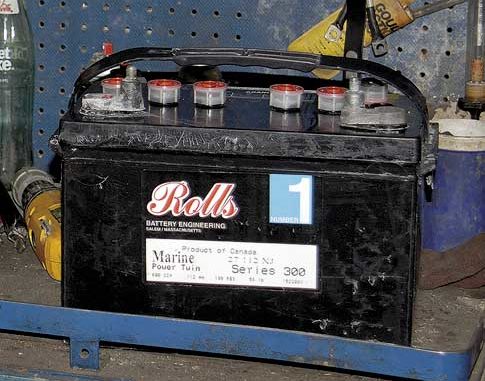
Many of our fishing techniques in Louisiana originated with our Indian anchestors.
When you fire up your computer and get a warning message reading, “Hard Drive Failure Imminent,” you pretty well know what is about to happen. I called the local geek squad and was told that new smart drives perform a self diagnostic when a computer boots up and let you know if something is wrong. It was time to replace the hard drive.
My boat’s cranking battery recently died, and while it
didn’t issue the stark warning I got from the computer, it offered the following subtle hints that its health was failing.
Hint No. 1
I keep my boat in the garage with its onboard charger plugged in 24/7, and every time I walk past the boat I look at the charger’s indicator lights. I noticed that the battery was charging more often than normal over the last month of its life. It would charge up normally after a trip, and then about every three or four days, the charger would kick on again to top it off.
I confirmed that I had everything in the boat turned off, and while things like the engine’s computer can continue to draw a tiny bit of power with the key off, the battery used to handle it for weeks without triggering the charger. This made me worry that either the battery was losing its ability to hold a charge or something had seriously reduced its storage capacity.
Hint No. 2
I keep my outboard trimmed full down in the garage to save room and make it easier to move the boat and trailer around without hitting anything. I trim it back up to a safe towing height before each trip to the lake.
I noticed that when the charger was disconnected, the trim motor seemed to run slower than usual, and it took longer to trim the outboard up to trailering position. The trim motor also seemed to run slower at the launch ramp as I trimmed the engine down before starting it.
Hint No. 3
When cranking the engine, the starter didn’t seem to turn the engine over as fast as usual, although the engine starts so quickly this was hard to tell for sure. And the change in starter motor speed happened so gradually that I didn’t notice it until it got really slow.
Hint No. 4
Running the electronics while fishing seemed to run the battery down further than normal. I can usually run two fish finder/GPS units for three or four hours of fishing without dropping the cranking battery voltage more than three-tenths of a volt. The boat’s volt meter reads about 12.9 volts after I stopped the outboard and started fishing. Three hours later it used to read around 12.6 volts. It fell to around 12.4 volts the last few trips before the battery died.
Hint No. 5
Checking the electrolyte’s specific gravity in each cell of a flooded battery is a messier but more accurate way to measure its state of charge than using a volt meter. I finally dragged out my hydrometer and checked the battery after the charger’s lights all went green. Each cell read less than fully charged.
The final hint
The charger’s lights were all green when I unplugged it to go to the lake, but the power trim worked very slowly as I lowered the engine far enough to start it. When I turned the key, it couldn’t rotate the engine a full revolution.
I took the battery to a local battery shop for a full set of tests. The news was bad: I was told it wouldn’t accept a normal charge, it failed the load test, and while none of its cells were shorted, they were all weak. The battery was dead.
I should have taken the battery in for testing when it gave me the first hint that its health was failing. In fact, it isn’t a bad idea to have an equalization charge done on a flooded battery (you can’t do them on sealed batteries) once a season, along with a set of health tests.
An equalization charge is a carefully controlled overcharge that brings weak cells back up to a normal level without damaging healthy cells that are already there. Healthy cells make for a healthy battery.
Paying attention to your batteries won’t keep them from sending you death notices sooner or later, but it should keep them from coming as a surprise.


